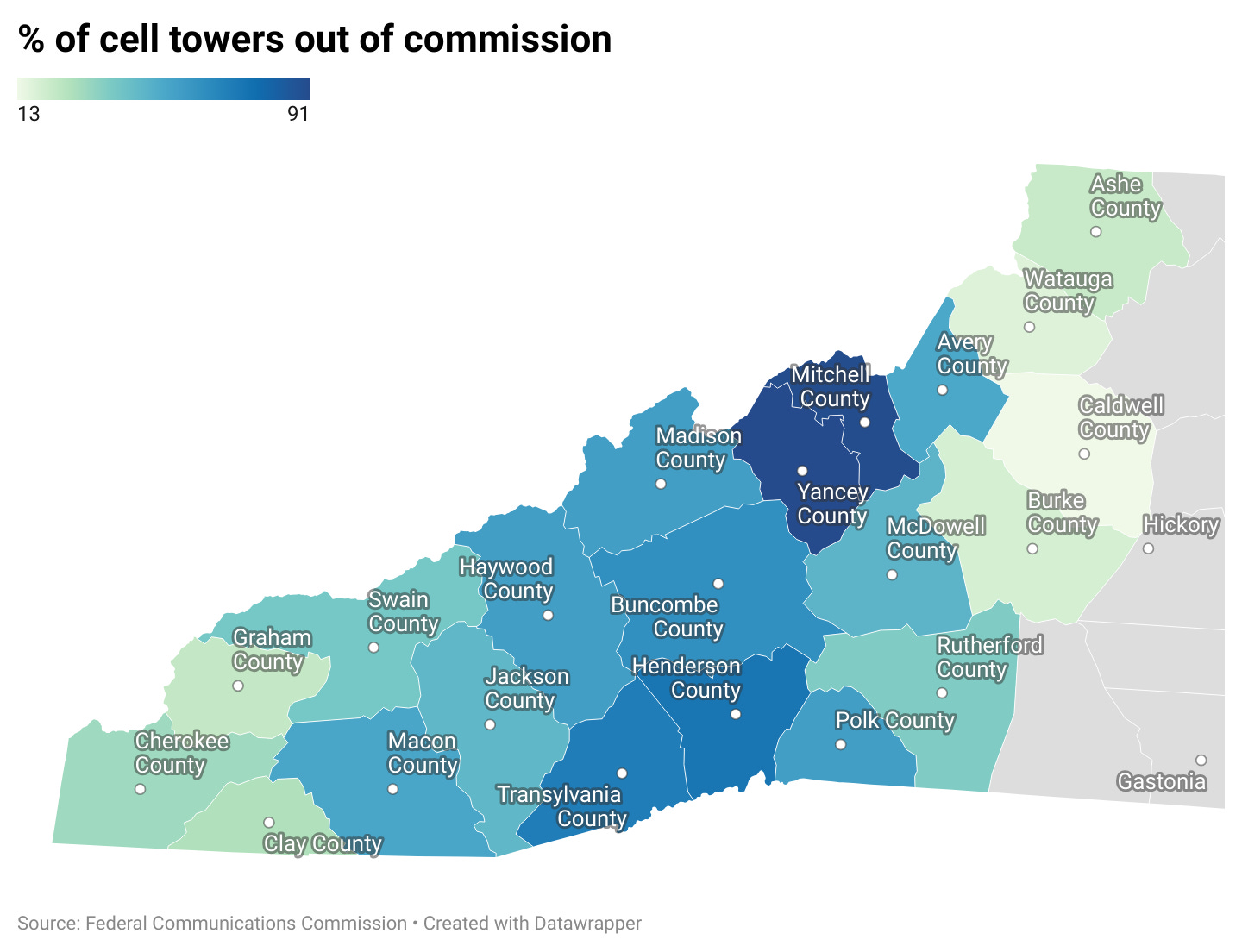Supplies running low in some remote rural areas
Plus: Biden tours by air; New data on cell phone operations; Supplies delivered by planes, horses and mules
You’re reading Mountain Updates, a free pop-up newsletter from The Charlotte Ledger examining the crisis and recovery in the N.C. mountains. Ledger subscribers can add Mountain Updates on their “My Account” page.
Sign up for free:
No power. No water. But a cup of coffee is something.
For thousands in Western North Carolina, it’s Day 6 without water and power. It’s Day 6 of not being able to wash hands or shower, or to cook a hot meal.
A volunteer with Black Mountain Presbyterian Church, which has become a community hub for supplies and hot meals, posted: “A jar of instant coffee … made one woman’s day who said it was so very precious.”
My Facebook, Instagram and TikTok feeds are still full of photos and videos of the devastation. I’ve also seen photos of the community coming together, delivering supplies or checking on neighbors, and photos of construction equipment and crews beginning the clean-up process.
Buncombe County, home to Asheville and Black Mountain, has received a lot of attention. But readers have pointed out that the damage is far more widespread.
Stories are starting to emerge from other, more remote counties such as McDowell, Rutherford, Haywood, Yancey and Avery, among others. These areas are still in desperate need of food, water, medicine, blankets, baby formula, hygiene products and other necessities.
In towns like Banner Elk, located in Avery County (population 18,000), roads have been so severely damaged that volunteers and crews are having difficulty getting supplies in. Supplies in Banner Elk are running low, and it’s unclear when deliveries will resume, WRAL reported on Tuesday night.
The N.C. Department of Transportation is estimating some roads will take weeks and months to repair.
In Yancey County (population 19,000), Jeff Hunter, who lives off Banks Creek, told WLOS:
“It’s beyond explaining, you can’t explain the devastation,” he said. “There’s a lot of it that will probably never be restored just because it’s completely gone.”
In towns and homes that will never be the same, something as simple as instant coffee can give someone hope.
Here is the latest news coming out of the region:
Biden plans to tour N.C. by air, deploys troops to aid with recovery: President Biden plans to tour the destruction in North Carolina by air this afternoon and to visit a Raleigh emergency operations center. The Charlotte Observer reported that some pilots flying supplies to the area are frustrated with flight restrictions during the president’s visit. Biden also ordered the deployment of up to 1,000 active-duty troops to aid in recovery efforts, the New York Times reported. The troops will join more than 6,000 National Guard members and 4,800 federal aid workers in the region.
Power outage update: As of this morning, Duke Energy reported 350,696 total outages in the state.
Water situation: About 100,000 people are without running water because of damaged infrastructure. Many have to resort to collecting water from swimming pools and hot tubs or floodwater to flush toilets. (Washington Post) In many areas, like Swannanoa, the only timeframe given for water restoration is “weeks.”
Pet supplies needed: Pet food and medicine are also on the list of needed supplies in many towns. Shelters like the McDowell County Animal Shelter are giving out dog and cat food.
Damage in Haywood County: The towns of Canton and Clyde experienced severe flooding, with the Pigeon River swelling to unprecedented levels. Canton Mayor Zeb Smathers described the situation as “apocalyptic,” with significant damage to downtown businesses, the former paper mill and wastewater treatment facility and critical infrastructure like the Pisgah High football field. Despite frustrations over poor communication services, the towns are relying on citizen efforts, and potable water distribution has been set up. (WLOS)
University closures: Several universities in Western North Carolina remain closed following the devastation. UNC Asheville’s classes will be suspended until at least Oct. 28. Appalachian State University and Western Carolina University will remain closed through Oct. 4. Warren Wilson College canceled classes for two weeks, while Montreat College and Lees-McRae College are also closed with plans for online instruction. (News & Observer)
Hospitals remain open: Western North Carolina hospitals have remained open amid widespread power outages, water failures and road closures. Emergency management teams and relief organizations are working to provide essential supplies, clear roads and restore utilities. (NC Health News) My cousin is a nurse at Mission Hospital in Asheville, and she told me the hospital has power and internet but water is expected to be another two weeks away. Atrium Health said it was deploying its mobile unit, MED-1, to Polk County. It’s “essentially a hospital on wheels,” WBTV reported.
In Tennessee, father hikes 30 miles to daughter’s wedding: David Jones braved Hurricane Helene's destruction to ensure he could walk his daughter Elizabeth down the aisle on her wedding day. After his drive from South Carolina to Tennessee was cut short due to flooding, Jones, a two-time marathoner, walked 30 miles through mud and debris in the early hours of the morning. Despite the challenges, he made it just in time for the wedding. (WJHL)
Where cell phones are working — and where they’re not
New data from the Federal Communications Commission shows that cell service is being restored but that some counties still have a majority of their cell towers out of service.
The data, updated Tuesday, shows that more than 90% of cell towers in Mitchell and Yancey counties (dark blue, below) were out of service as of 9 a.m. Tuesday.
Service was far better in outlying counties. Just 13% of cell towers in Caldwell County (home to Lenoir) and 17% in Watauga County (home to Boone and Blowing Rock) were down.
➡️ You can read the full report here.
Photo of the day: Helpers taking to the skies

Pilots around the region are working to fly donations to hardest hit areas from airports and airfields across the region. In Lincoln County, approximately 40 pilots have been loading up their planes each day since Monday at the Lincoln County Airport as part of a grassroots community effort (above). As of Tuesday night, more than 100 flights had gone out of the airport carrying more than 35,000 lbs. of supplies.
At Hickory Regional Airport, volunteers with Operation Airdrop are using private helicopters to deliver essential supplies, The Charlotte Observer reports. About three dozen pilots fly into Western North Carolina, navigating dangerous terrain and shredded roads, to deliver items like baby formula, diapers and food to those who are stranded.
Father in Bat Cave, west of Lake Lure, describes the destruction: ‘This is worse than any war that I’ve been in’

 Tiktok failed to load.
Tiktok failed to load.Enable 3rd party cookies or use another browser
Supplies carried by mule in Buncombe County; nurses on horses near Boone
In Black Mountain, supplies are being delivered on mule-back thanks to Mount Ulla-based Mountain Mule Packer Ranch.
“They call them beasts of burden, we call them our beloved mules,” a Facebook post from the ranch said.
A team of mules, who have previously served in the military carrying weapons, medical supplies and even wounded soldiers, are now helping people in Black Mountain who need supplies. (Photo courtesy of Mountain Mule Packer Ranch/Facebook)
The Mountain Mule Packer Ranch, in partnership with the Cajun Navy, has set up a staging area in Montreat, a small college town next to Black Mountain, to transport essential goods like insulin to isolated areas that are unreachable by cars.
Nurses on horses: Separately, in Watauga County, a group of nurses took to horseback to deliver medical supplies in Sugar Grove, near U.S. 321 west of Boone, the Watauga Democrat reported. They started with about 25 horses and people.
A nurse from Catawba County said: “I have rode horseback and done a lot of nursing. I have never mixed the two together, so today will be a first.”
How to help
Blue Ridge Public Radio, a public radio station based in Asheville, has one of the most comprehensive lists we’ve seen of local, on-the-ground organizations aiding in the recovery effort. Check it out here.
—
Lindsey Banks is a staff reporter with The Charlotte Ledger. Reach her at lindsey@cltledger.com.
Need to sign up for this e-newsletter? We offer a free version, as well as paid memberships for full access to all of our local newsletters:
➡️ Opt in or out of different newsletters on your “My Account” page.
➡️ Learn more about The Charlotte Ledger
The Charlotte Ledger is a locally owned media company that delivers smart and essential news through e-newsletters and on a website. We strive for fairness and accuracy and will correct all known errors. The content reflects the independent editorial judgment of The Charlotte Ledger. Any advertising, paid marketing, or sponsored content will be clearly labeled.
Like what we are doing? Feel free to forward this along and to tell a friend.
Social media: On Facebook, Instagram, Twitter and LinkedIn.
Sponsorship information/customer service: email support@cltledger.com.
Executive editor: Tony Mecia; Managing editor: Cristina Bolling; Staff writer: Lindsey Banks; Business manager: Brie Chrisman




